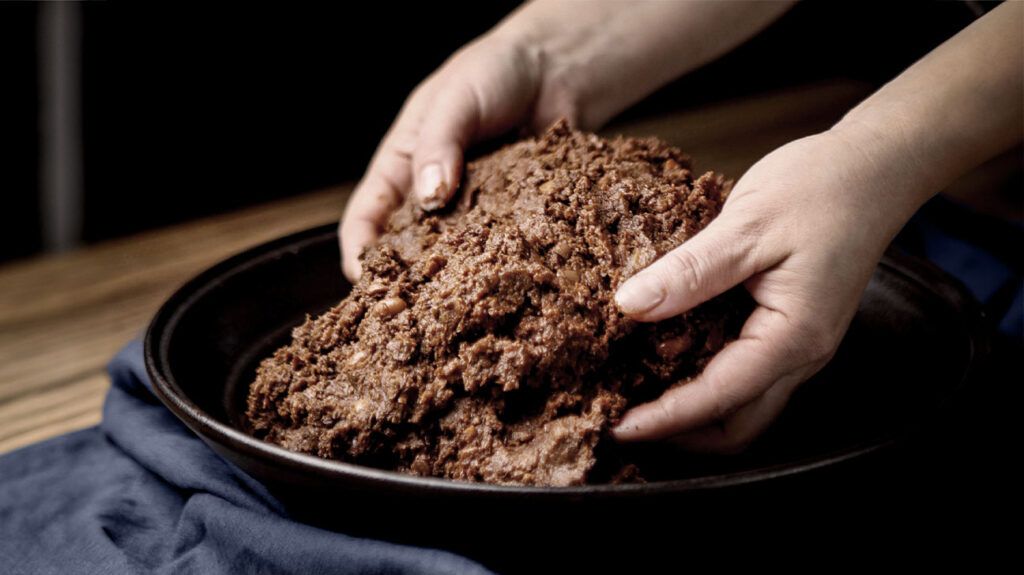
- A new study suggests Korean soybean paste, known as doenjang, can relieve menopausal symptoms.
- The study finds that traditional doenjang more effectively alleviates menopause symptoms compared to commercially produced doenjang.
- Among the doenjang samples tested, the one with the least beneficial bacteria produced the strongest result.
A new study investigated the effectiveness of a Korean soybean paste known as doenjang on alleviating symptoms of menopause.
The findings show that traditionally produced doenjang successfully reduces menopausal symptoms.
Doenjang paste is one of the oldest fermented foods in Asia, dating back over 2,000 years. It significantly predates miso paste, which first became popular in China before making its way to Japan.
While miso is made from peeled soybeans that ferment over a period of weeks, doenjang matures from several weeks to two years. It consists of fermented, unpeeled soybeans. Its subtly tangy, strong umami flavor has undertones of nuttiness and earthiness. Miso, made from peeled soybeans, is not as thick, and is milder and sweeter.
Like miso, doenjang is typically salty, since it is fermented with salt, which can itself be a cardiometabolic concern. Both miso and doenjang can serve as the basis of broths and as a flavoring in various dishes.
The recent investigation of doenjang is part of ongoing explorations of the impact of fermented foods on the gut microbiome. One of the goals of the study was to determine if more bacteria content in doenjang produced better results than less.
The study is published in nutrients.
For the study, researchers tested three types of doenjang. The first two were traditionally produced, with one containing a low dose of beneficial microbes, and one containing a high dose.
The effectiveness of these was compared to commercially produced doenjang that contained more beneficial microbes than either traditional sample.
The level of Bacteriodetes microbes increased in the two types of doenjang with the highest levels of beneficial microbes. While beneficial in the human gut, Bacteriodetes can cause serious infections in other parts of the body.
The researchers measured menopause symptoms using the Kupperman index, which tracks symptoms such as:
- hot flashes
- tingling of peripheral nerves
- insomnia
- nervousness
- melancholia
- vertigo
- weakness
- arthritis or muscle pain
- headache
- palpitations
- a sensation of insects crawling over the skin
All three types of doenjang lowered participants’ Kupperman index, but the doenjang with the lowest level of beneficial microbes proved most effective at reducing menopausal symptoms.
The researchers also measured changes in obesity, inflammation, and levels of LDL, or “bad cholesterol,” that can lead to cardiovascular issues. Lower LDL cholesterol was seen only in participants consuming the traditional doenjang. No effect on obesity or inflammation was observed.
Traditional vs. commercial doenjang
The authors of the study noted that traditional and commercial doenjang have some fundamental differences that may explain the study’s finding of the commercial version’s relative ineffectiveness.
Traditional soybean-based doenjang contains fungi such as Aspergillus oryzae and beneficial microorganisms such as Bacillus subtilis, which are involved in the
Commercial doenjang is based on
Research on the health benefits of various fermented foods is ongoing.
Korean kimchi and Japanese kombucha may offer health benefits as well, but fermented foods are not exclusive to Asian countries; sauerkraut and kefir cheese are commonly found in the West.
“Currently, there’s a great deal of interest in the benefits of fermented foods, and it does seem that they might support our gut and overall health,” Sarah E. Berry, PhD, associate professor in the Department of Nutritional Sciences at King’s College London and chief scientist at ZOE, not involved in the study, told Medical News Today.
“For now, though, there isn’t enough evidence to show they can ease menopausal symptoms, specifically. As with almost all aspects of female health, we need much more research,” Berry noted.
Kelsey Costa, a registered dietitian nutritionist and founder of Dietitian Insights, not involved in the study, shared her thoughts on the findings with MNT:
“We aren’t at the stage yet where we can confidently predict which ones will have the most beneficial effects on our health. Research suggests that addressing gut microbiota imbalances could help modulate the gut-brain axis and improve mood in middle-aged and older women.”
Costa suggested incorporating a wide range of fermented foods into a healthy, balanced diet, which may help ensure “exposure to different probiotic strains and potentially offering more comprehensive health benefits.”
Both Berry and Costa noted that while the findings of the study are intriguing, there are some limitations.
“There is no control group — all participants received doenjang,” Berry said. “This makes it difficult to interpret the results, as sometimes, simply being involved in an experiment can make people feel better.”
Costa pointed out the short duration of the study and its small sample size. She also cited the Hawthorne effect, when “participants alter their behavior because they know they’re being observed, possibly impacting the study’s results.”
Berry suggested the study’s outcomes “may have been influenced by a lack of control over participants’ diet, activity, exercise, and lifestyle choices.”
Berry also noted differences in the Kupperman index scores at the start of the study.
“The group that consumed traditional doenjang saw the greatest reduction in scores, but they also had the highest scores to begin with,” she said.
